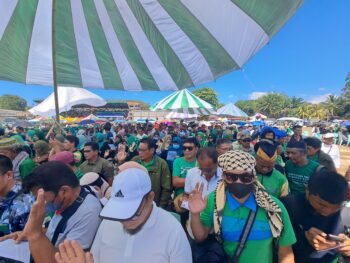MALAYBALAY CITY (MindaNews/27 July) – How do you – or maybe, how can
you – wean politics from sports? Even the Olympics, which opens its 30th season 9pm today (July 27) in London (4am on July 28 in the Philippines) has never been spared from the ordure of global power play and maneuverings.
The Summer Olympic Games, the venue where the world’s greatest athletes compete in a spirit of friendship and true sportsmanship, has had been marred by politics since its earlier days. Four editions of the Games stood out as glaring examples of this ignominy: the 1936, 1976, 1980 and 1984 Games held in Berlin, Montreal, Moscow and Los Angeles, respectively.
Adolf Hitler had meant to use the Games as a propaganda tool for the Nazi dictatorship and his racist ideology. He wanted to bar Blacks and Jews from participating, but ultimately yielded to international pressure including threats by several countries to boycott the Games.
Hitler asserted his Aryan ego by allowing only one Jewish, a woman named Helene Mayer, to the German team.
For reasons of their own, Spain, then led by a Left-wing government, and the Soviet Union (now reduced to the Russian Federation) boycotted the event. In the United States, debates were intense, yet in the end, President Franklin Delano Roosevelt decided to send a team. The Philippines, then an American colony, also sent a delegation.
In the final medal tally, host Germany landed on top with 33 gold, 26 silver and 30 bronze medals, followed by the US with 24 gold, 20 silver and 12 bronze medals. Hungary placed third with 10 gold, 1 silver and 5 bronze medals, and Italy was fourth with an 8 gold, 9 silver and 5 bronze medal haul. Finland and France tied for fifth place with a 7-6-6 record.
However, despite Germany’s overall victory in the 1936 Olympiad Hitler failed in a way to maximize it as a showcase of Aryan supremacy. Jesse Owens, an African-American track and field athlete, became the icon of the event. He took home four gold medals, one each in the 100 meters, 200 meters, long jump, and as part of the 4×100 meter relay team.
Another African-American, Carl Lewis, replicated Owens’ feat, in the 1984 LA Olympics.
Germany tried to erase the racist undertones of the 1936 Olympics when it again hosted the Games in 1972, in Munich. But a Palestinian group called Black September spoiled what could have been the host country’s act of redemption by taking hostage eleven Israeli athletes and coaches and killing them in a bungled rescue attempt by German police.
After that bloody episode in Munich, the Summer Games would be hounded by another problem three times in a row – boycott.
The 1976 Montreal Olympiad was marred by a boycott by African countries over the refusal of the International Olympic Committee to ban New Zealand. Earlier that year, the New Zealand rugby team toured South Africa, which had been banned from the Games since 1964 due to its apartheid policies.
In the 1980 Moscow Olympics it was Cold War geopolitics that fueled a boycott by the US and sixty-four other countries including the Philippines. The boycott was in protest over the December 1979 Soviet invasion of Afghanistan. But athletes from some countries that boycotted the Games participated as individuals under the Olympic flag. Among them were athletes from France, Denmark, Netherlands and Great Britain.
The Soviet Union hit back by leading a boycott by fourteen Eastern bloc countries (except Romania) of the 1984 LA Olympics, apparently over the October 1983 US invasion of Grenada, a former French and later British colony in the Caribbean.
Fortunately for the Games, no boycotts and other disruptions have occurred after 1984. What a relief for athletes who only wish to live up to the enduring Olympic motto of “Faster, Higher, Stronger.” (MindaViews is the opinion section of MindaNews. H. Marcos C. Mordeno can be reached at hmcmordeno@gmail.com)
